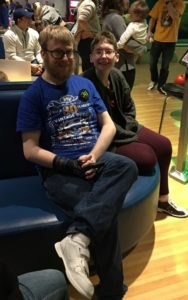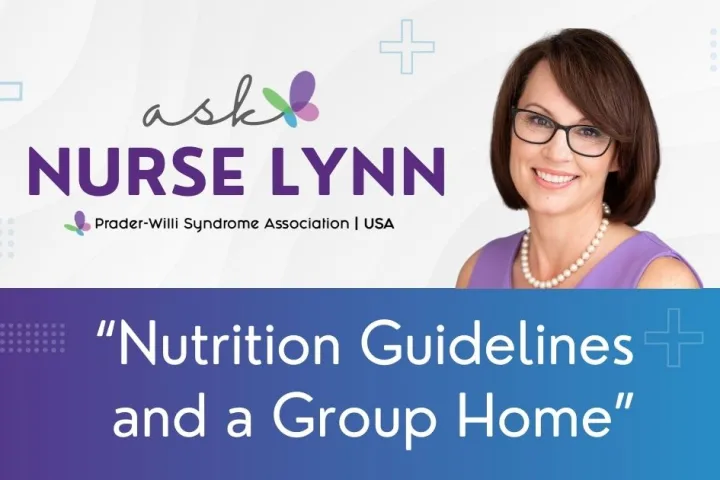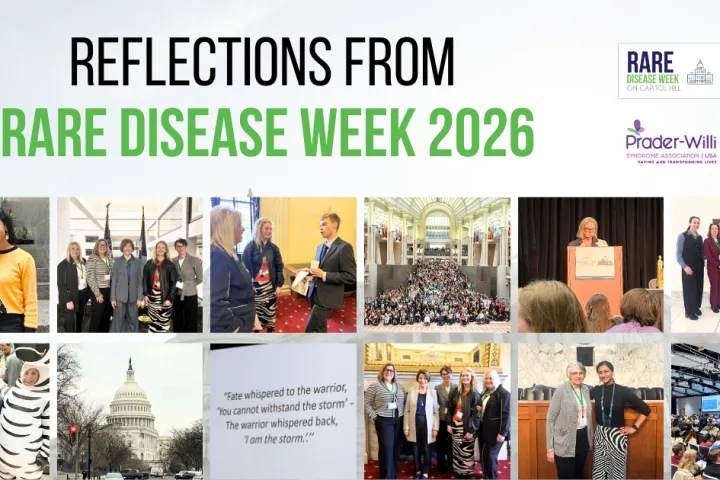Living and Thriving with PWS – The Early Years
By Derek Montecalvo
Hi, my name is Derek Montecalvo and I’m a 30-year old young adult with Prader-Willi Syndrome. I was diagnosed when I was very little via bloodwork. My parents are Gregory and Sharon Montecalvo, and I have an older brother named Aaron Montecalvo. When I was younger, there were a lot of “what-ifs” and unknowns due to my diagnosis. My parents wanted as many avenues open to me as possible. They started me with early-intervention and PT and OT at the age of 2. I started speech therapy at the age of 3 and concluded upon entering 2nd grade in elementary school. During elementary school, I was not in any special-education classes and did not require any extra needs. I was raised into healthy eating and did not experience much of the primary food-seeking behaviors associated with PWS. School lunches from home were packed daily as I didn’t buy school lunches. But upon entering the 4th grade, I was known to raid the salad bar by way of being offered free lunch. Strangely enough, I wasn’t interested in cafeteria-based foods and was only interested in the salad bar with the added extra of chocolate pudding. But my weight never became an issue due to the due diligence of my parents teaching me healthy eating habits and making sure I got daily exercise.
Upon entering middle school, I still did not require special education services and instead stuck with mainstream classes. It wasn’t until 9th grade that I needed the extra help, so I received resources for an hour twice a week for any extra help I may have needed. I still was packing lunches up to this point. Upon entering my junior year, I noticed my food-seeking behaviors becoming more prevalent; I would get money from other students to buy an extra lunch or a pack of cookies from the snack cart. My weight was not an issue yet. My senior year ended up being more of a challenge because during the final 6 months, I was out for 4 months recuperating from a posterior spinal fusion due to scoliosis curve progression to above 30 degrees. Through in-home tutoring and additional extra help, I graduated in 2008 with a high school diploma.
Join us next week for Living and Thriving with PWS – The Transition to College

About the author: Derek Montecalvo is a college student with Prader-Willi syndrome (PWS). Derek has authored a series of blog posts about his journey with PWS and hopes to be a beacon of hope for others that love someone with PWS. Derek is proud of his stripes and no longer afraid of his rare disease and continues to not just live his life – but thrive – with PWS.





 Perry A. Zirkel has written more than 1,500 publications on various aspects of school law, with an emphasis on legal issues in special education. He writes a regular column for NAESP’s Principal magazine and NASP’s Communiqué newsletter, and he did so previously for Phi Delta Kappan and Teaching Exceptional Children.
Perry A. Zirkel has written more than 1,500 publications on various aspects of school law, with an emphasis on legal issues in special education. He writes a regular column for NAESP’s Principal magazine and NASP’s Communiqué newsletter, and he did so previously for Phi Delta Kappan and Teaching Exceptional Children. Jennifer Bolander has been serving as a Special Education Specialist for PWSA (USA) since October of 2015. She is a graduate of John Carroll University and lives in Ohio with her husband Brad and daughters Kate (17), and Sophia (13) who was born with PWS.
Jennifer Bolander has been serving as a Special Education Specialist for PWSA (USA) since October of 2015. She is a graduate of John Carroll University and lives in Ohio with her husband Brad and daughters Kate (17), and Sophia (13) who was born with PWS. Dr. Amy McTighe is the PWS Program Manager and Inpatient Teacher at the Center for Prader-Willi Syndrome at the Children’s Institute of Pittsburgh. She graduated from Duquesne University receiving her Bachelor’s and Master’s degree in Education with a focus on elementary education, special education, and language arts.
Dr. Amy McTighe is the PWS Program Manager and Inpatient Teacher at the Center for Prader-Willi Syndrome at the Children’s Institute of Pittsburgh. She graduated from Duquesne University receiving her Bachelor’s and Master’s degree in Education with a focus on elementary education, special education, and language arts. Evan has worked with the Prader-Willi Syndrome Association (USA) since 2007 primarily as a Crisis Intervention and Family Support Counselor. Evans works with parents and schools to foster strong collaborative relationships and appropriate educational environments for students with PWS.
Evan has worked with the Prader-Willi Syndrome Association (USA) since 2007 primarily as a Crisis Intervention and Family Support Counselor. Evans works with parents and schools to foster strong collaborative relationships and appropriate educational environments for students with PWS. Staci Zimmerman works for Prader-Willi Syndrome Association of Colorado as an Individualized Education Program (IEP) consultant. Staci collaborates with the PWS multi-disciplinary clinic at the Children’s Hospital in Denver supporting families and school districts around the United States with their child’s Individual Educational Plan.
Staci Zimmerman works for Prader-Willi Syndrome Association of Colorado as an Individualized Education Program (IEP) consultant. Staci collaborates with the PWS multi-disciplinary clinic at the Children’s Hospital in Denver supporting families and school districts around the United States with their child’s Individual Educational Plan. Founded in 2001, SDLC is a non-profit legal services organization dedicated to protecting and advancing the legal rights of people with disabilities throughout the South. It partners with the Southern Poverty Law Center, Protection and Advocacy (P&A) programs, Legal Services Corporations (LSC) and disability organizations on major, systemic disability rights issues involving the Individuals with Disabilities Education Act (IDEA), Americans with Disabilities Act (ADA), and the federal Medicaid Act. Recently in November 2014, Jim retired.
Founded in 2001, SDLC is a non-profit legal services organization dedicated to protecting and advancing the legal rights of people with disabilities throughout the South. It partners with the Southern Poverty Law Center, Protection and Advocacy (P&A) programs, Legal Services Corporations (LSC) and disability organizations on major, systemic disability rights issues involving the Individuals with Disabilities Education Act (IDEA), Americans with Disabilities Act (ADA), and the federal Medicaid Act. Recently in November 2014, Jim retired.